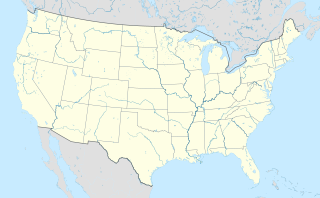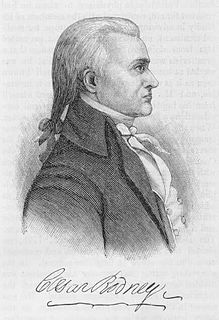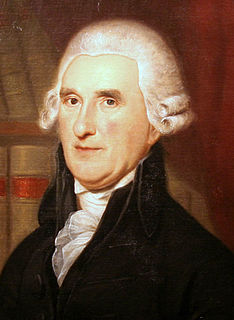
Thomas McKean was an American lawyer and politician from New Castle, in New Castle County, Delaware and Philadelphia. During the American Revolution he was a delegate to the Continental Congress where he signed the United States Declaration of Independence and the Articles of Confederation. McKean served as a President of Congress. He was at various times a member of the Federalist and Democratic-Republican parties. McKean served as President of Delaware, Chief Justice of Pennsylvania, and Governor of Pennsylvania.

New Castle is a city in New Castle County, Delaware, six miles (10 km) south of Wilmington, situated on the Delaware River. According to the 2010 Census, the population of the city is 5,285.

George Read was an American lawyer and politician from New Castle in New Castle County, Delaware. He was a signer of the Declaration of Independence, a Continental Congressman from Delaware, a delegate to the U.S. Constitutional Convention of 1787, President of Delaware, and a member of the Federalist Party, who served as U.S. Senator from Delaware and Chief Justice of Delaware. Read was one of only two statesmen who signed all three of the great State papers on which the country's history is based: the original Petition to the King of the Congress of 1774, the Declaration of Independence, and the Constitution of the United States.
James Sykes was an American physician and politician from Dover, in Kent County, Delaware. He was a member of the Federalist Party, who served in the Delaware General Assembly and as Governor of Delaware.
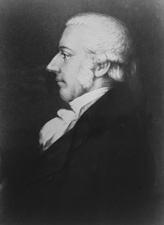
Nicholas Van Dyke was an American lawyer and politician from New Castle, Delaware. He was a member of the Federalist Party, who served in the Delaware General Assembly, as Attorney General of Delaware, as U.S. Representative from Delaware, and as U.S. senator from Delaware.
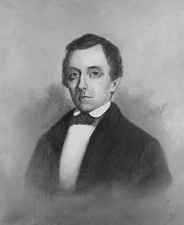
Daniel Rodney was an American merchant and politician from Lewes in Sussex County, Delaware. He was a member of the Federalist Party, and later the National Republican Party, who served as Governor of Delaware, U. S. Representative from Delaware and U.S. Senator from Delaware.

Charles Polk Jr. was an American farmer and politician from Big Stone Beach, in Milford Hundred, Kent County, Delaware. He was a member of the Federalist Party, and later the Whig Party, who served in the Delaware General Assembly and twice as Governor of Delaware.

Thomas Stockton was an American soldier and politician from New Castle in New Castle County, Delaware. He was a veteran of the War of 1812, and a member of the Whig Party, who served as Governor of Delaware.

Thomas Collins was an American planter and politician from Smyrna, in Kent County, Delaware. He was an officer of the Delaware militia during the American Revolution, and served in the Delaware General Assembly and as President of Delaware.
John Cook was an American planter and politician from Smyrna, in Kent County, Delaware. He served in the Delaware General Assembly and as Governor of Delaware.

Dr. Joshua Clayton was an American physician and politician from Mt. Pleasant in Pencader Hundred, New Castle County, Delaware. He was an officer of the Continental Army in the American Revolution, and a member of the Federalist Party, who served in the Delaware General Assembly, as Governor of Delaware and as U.S. Senator from Delaware.
Gunning Bedford Sr. was an American lawyer and politician from New Castle, in New Castle County, Delaware. He was an officer in the Continental Army during the American Revolution, and a member of the Federalist Party, who served in the Delaware General Assembly and as Governor of Delaware. He is often confused with his cousin, Gunning Bedford Jr., who was a delegate to the U.S. Constitutional Convention of 1787.
David Hall was an American lawyer and politician from Lewes, in Sussex County, Delaware. He was an officer in the Continental Army during the American Revolution, and member of the Democratic-Republican Party, who served as Governor of Delaware.
The Delaware Constitution of 1792 was the second governing document for Delaware state government. The Constitution was in effect from its adoption, on June 12, 1792, until it was replaced, on December 2, 1831, by a new Constitution.
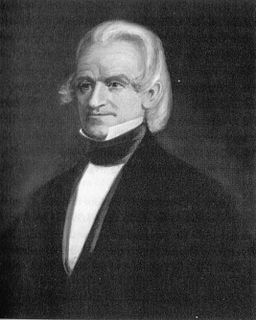
Kensey Johns Jr. was an American lawyer and politician from New Castle, in New Castle County, Delaware. He was a member of the Federalist and Whig Parties who served as U.S. Representative from Delaware.
Kensey Johns (1759–1848) was a lawyer, politician, jurist and plantation owner from Delaware.

The 7th Delaware General Assembly was a meeting of the legislative branch of the state government, consisting of the Delaware Legislative Council and the Delaware House of Assembly. Elections were held the first day of October and terms began on the twentieth day of October. The Assembly met in the state capital, Dover, convening October 20, 1782, in the administration of Delaware President John Cook. He resigned by agreement and was replaced by President Nicholas Van Dyke, effective February 1, 1783.
Henry Van Dyke Johns (1803–1859) was an Episcopal clergyman who served as Chaplain of the Senate.




